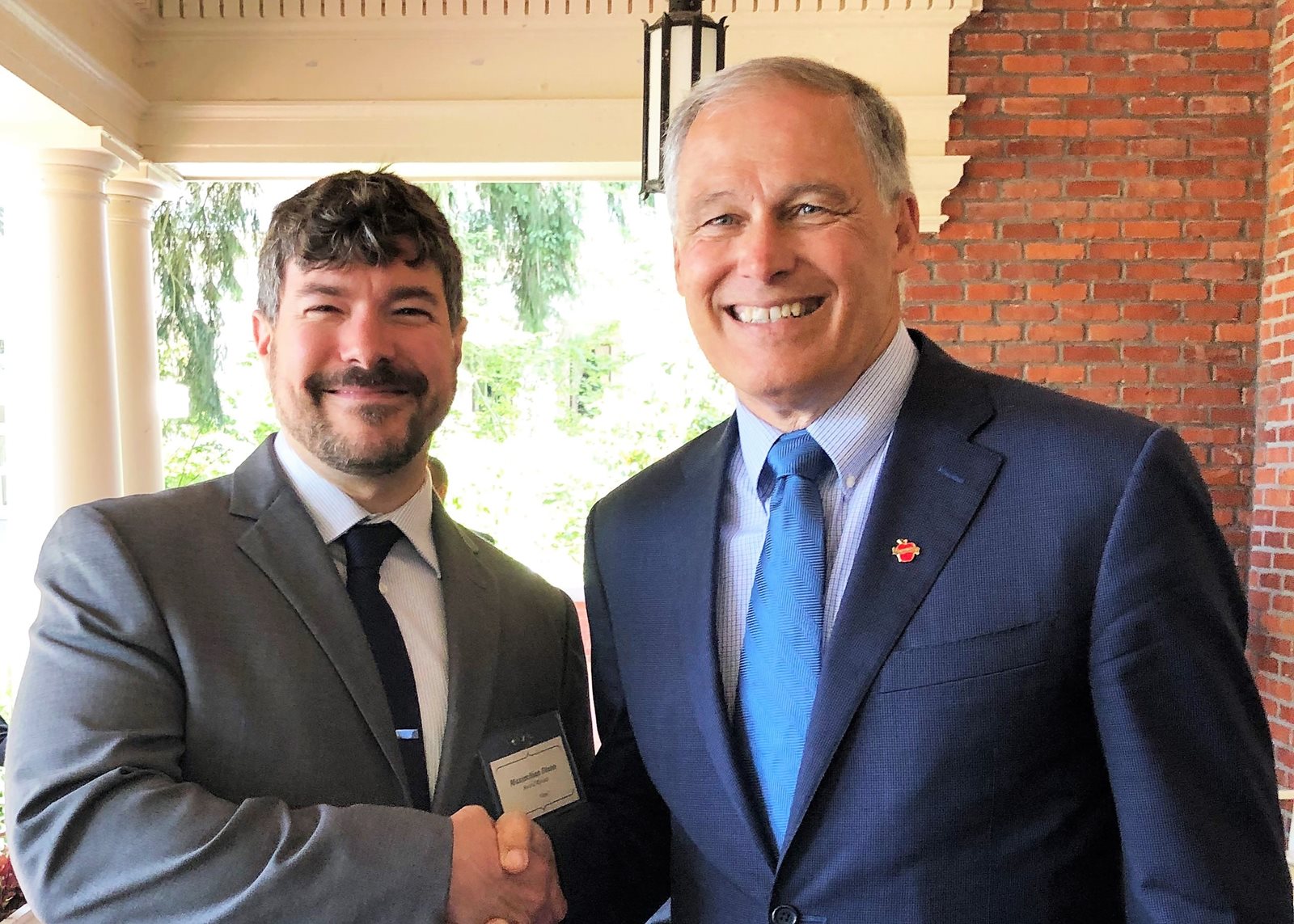
By Sean Park
The recent earthquake in Snohomish County has renewed discussions about preparedness for when the “big one” hits the Northwest. For University of Washington Bothell alumnus Maximilian Dixon, the conversation around this issue never stops.
Dixon recently received the Governor’s Award for Leadership in Management for his collaboration to promote earthquake readiness through drills, symposiums for emergency managers and outreach to coastal communities.
The annual award recognizes managers in state government who demonstrate extraordinary leadership through performance results over the past year. The award was presented by Gov. Jay Inslee at a luncheon in June.
“It was a great honor to receive the award,” said Dixon, supervisor of the Hazards and Outreach Program in the Emergency Management Division of the Washington Military Department. “I wish my whole team could have been there with me because I really consider it a team award.
“In emergency management, like most things in life, you can’t do things by yourself.”
Prepping for success
Dixon graduated magna cum laude in 2011 from UW Bothell with a bachelor’s degree in Environmental Studies.
“I can trace the skills I use in my job — and in fact the reasons I got this award — to specific classes at UW Bothell,” Dixon said.
His ability to develop awareness campaigns, for example, stemmed from classes such as Intro to Restoration Ecology.
“I learned to take a lot of complex information, distill it down to the key essentials and then display it in a visually appealing, easy-to-understand way,” he said. “My team’s materials have garnered attention and awards for social media campaigns, which resulted in increased participation in the Great Washington Shakeout earthquake drills and other emergency-preparedness activities.”
In one project as part of his Geographic Information Systems (GIS) class, Dixon used GIS technology to create a map of the UW Bothell campus. This experience was invaluable when he and his team needed to create maps of safe routes to higher ground during tsunamis. In the process, he said, “we identified gaps in the current emergency response system and took the initiative to install more sirens and seismic warning stations.”
Getting involved
While at UW Bothell, Dixon took advantage of a variety of opportunities to learn outside the classroom. He was a member of the Commuter Services Task Force and participated in some faculty hiring searches.
He also founded the Sustainability Club for UW Bothell and Cascadia College, which are co-located on a shared campus. Dixon served as the club’s first president and during his term helped create the campus’ first-ever Earth Day event in 2011. The event was packed with sustainability-related activities selected to create awareness and understanding of individual and global efforts that impact the environment. “I’m proud to see that the club and event are still going strong today,” he said.
Dixon said he had many great professors at UW Bothell — and remembers one with special gratitude: Warren Gold, an associate professor in the School of Interdisciplinary Arts & Sciences, who inspired Dixon with his passion for teaching and for helping students succeed.
“He recognized my interest in pursuing grad school and made some excellent suggestions on how to go about applying, which was extremely helpful,” said Dixon. After graduation, he went on to receive master’s degrees in Urban Planning and in Infrastructure Planning & Management at the University of Washington in 2014.
Beyond Gold’s support for Dixon academically, “what I appreciated about him most is how much he cares for our wonderful planet!”
Serving the public
Dixon began serving his local community as a child when his father brought him along to help restore the habitat at Twin Ponds Park in Shoreline, Washington. The two of them cleared out a heavy load of concrete, debris and trash before planting groundcover, shrubs and trees.
“Ever since I was a kid, I found myself working to improve parks,” Dixon said. “That really instilled a sense of love for nature and community.”
Some of Dixon’s more recent volunteer efforts include co-founding the Shoreline Farmers Market Association and being a founding member for Friends of North Creek Forest. He also is currently a volunteer for Seafair and the American Red Cross.
To date, Dixon estimates he has donated more than 5,000 volunteer hours for numerous non-profit organizations.
He credits some of his successes as a volunteer and a working professional to the investments made in him when he was an undergraduate student.
“The classes, the professors and the service opportunities at UW Bothell — there’s no way I would be in the position I’m in today had I not taken advantage of all that was available,” Dixon said. “Every step I took helped build my confidence and ability to do the things I do.”
More to be done
Under Dixon’s leadership, the public is more equipped and aware of natural disasters than ever before. But there’s more work to be done.
“In academia, you never stop learning. In emergency management, we never stop looking for more and better ways to reduce risk and lead on a state level to save as many lives as we can.”



